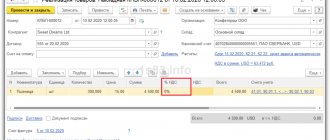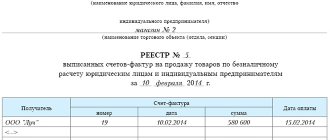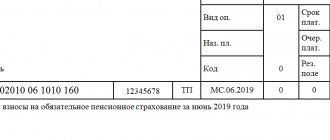Violation of obligations under the supply contract
The penalty is established in the form of a fine or penalties. If the penalty is established in the form of a fine, then it does not depend on the duration of the violated obligations and is a fixed amount. When a supply contract provides for penalties for violation, their size is directly related to the duration of this violation.
Important! The amount of the fine does not depend on the period of time for which the obligation was violated. Penalties are directly related to the duration of the violation of the obligation.
In this regard, when concluding an agreement, the parties must evaluate what will be most effective when a particular situation arises.
What information should be included in the claim?
There are no special requirements for the content of a claim in the law. In practice, a claim usually consists of a header (introductory part), a title (“claim”), a descriptive part (circumstances of the violation), requirements for the supplier, a list of attachments and the signature of a person authorized by you.
If you are making a claim for a violation of the delivery time or a claim for the delivery of low-quality goods, then be guided by the general principles of drawing up a claim, taking into account the specifics for the descriptive part (which requirements to choose and how to justify them).
Header (introductory part)
In the header of the claim please indicate:
- addressee. It will always be the person indicated in the contract as the supplier, your counterparty, even if regarding delivery issues you are in contact with different persons who are part of the same group of companies. If you send a claim to the wrong person, the claim procedure will not be followed. If this was a mandatory procedure by force of law, the court will leave the claim without progress and (or) return it or leave the claim without consideration if it has already been accepted for proceedings (parts 1, 2, 4 of article 128, paragraph 5 of part. 1, Article 129, clause 2, part 1, article 148 of the Arbitration Procedure Code of the Russian Federation).You can address the claim to both the legal entity and its head. Indicate the supplier's organizational and legal form, name, OGRN, INN, KPP, location address, contact phone number, email address. If your supplier is an individual entrepreneur, indicate his last name, first name and patronymic, OGRNIP, Taxpayer Identification Number, residence address;
- details of your organization (organizational and legal form, name, OGRN, INN, KPP, location address, contact phone number, email address);
- date and reference number of the claim.
Descriptive part
The content of this part of the claim depends on what violation the supplier committed.
Please indicate in the descriptive section:
- details of the supply agreement (name, date of conclusion, number);
- what is the violation of obligations by the supplier, indicating the clause of the contract and the rule of law. For example, if the supplier supplied goods in an inconsistent assortment, describe what assortment and in which section of the contract was agreed upon and how exactly the supplier violated the assortment;
- under what circumstances the violation was discovered (by whom, how, when). This will help substantiate the claim and confirm that you discovered the violation in a timely manner. For example, it is important to detect an improper quantity of goods upon acceptance and immediately notify the supplier (Clause 2 of Article 513 of the Civil Code of the Russian Federation);
- evidence of violation. These could be, for example, invoices with acceptance dates or documents that you drew up to document the violation (acts, conclusions).
Example of a claim narrative
03/01/2018 Gamma LLC (supplier) and Andromeda LLC (buyer) entered into supply agreement No. 87/k-yul. According to clause 1.3. of the contract, the supplier was required to supply office supplies in the range and quantity established in the specifications to the contract. The supplier delivered the goods to the buyer’s warehouse on March 15, 2018 (consignment note No. 45/87/k-yul). Upon acceptance of the goods, a discrepancy in the quantity of goods was revealed: instead of plastic folders (line 5 of the specification) in the amount of 250 pcs. 150 pcs were delivered, which is 100 pcs. less than agreed, does not comply with the terms of the contract and clause 1 of Art. 465 of the Civil Code of the Russian Federation. The discrepancy in quantity was recorded in an act in form N TORG-2 dated March 15, 2018, the supplier was notified of the discrepancy in quantity of goods by letter ref. N 183 dated March 15, 2018.
Supplier requirements
This part of the claim is key for you. It is in it that you write to the supplier exactly what you want to demand from him due to the fact that he has violated his obligations under the contract.
Clearly state the claim based on the right that the law or contract gives you, and support it with reference to the relevant rules. If you require a refund, please provide the exact amount. If you do not include a specific requirement in the claim, and the mandatory claim procedure is provided for by law, the court may decide that you have not complied with it, and will leave the claim without progress and (or) return it or leave it without consideration if it was accepted for proceedings (h 1, 2, 4, Article 128, clause 5, part 1, article 129, clause 2, part 1, article 148 of the Arbitration Procedure Code of the Russian Federation).
Set a deadline for the supplier to satisfy the requirement if it is not specified in the contract. If there is no deadline in the contract and you do not establish it in the claim, then a claim in court for claims with mandatory pre-trial procedure can be filed only after the expiration of the period established by law. For example, for a monetary claim you will need to wait 30 calendar days from the date the claim was sent (Part 5, Article 4 of the Arbitration Procedure Code of the Russian Federation).
Indicate that if your request is not fulfilled on time, you will go to court to protect the violated rights.
How many requirements can be presented to the supplier?
Depending on the violation, you may present one or several demands to the supplier at the same time or in a certain sequence. The main ones are liability measures (losses, penalties). You can also make other demands that are aimed at forcing the supplier to properly fulfill the obligation (for example, to complete the goods).
In particular, you can present to the supplier:
- one requirement . For example, if the supplier has not handed over to you the documents related to the goods, then you have the right to demand the transfer of these documents within a reasonable time (Article 464 of the Civil Code of the Russian Federation). Or you demand to pay a contractual penalty for late delivery of goods;
- one requirement of your choice from the list, which is fixed by law or contract. So, if you were supplied with a product with defects, in a claim for the delivery of low-quality goods, you have the right to choose to demand: a proportionate reduction in the price, elimination of the defects free of charge, or compensation for the costs of their elimination (clause 1 of Article 475 of the Civil Code of the Russian Federation);
- several requirements at the same time . For example, the goods were not delivered to you on time, but you made an advance payment. As a general rule, in a claim for violation of delivery deadlines, you can demand its return and at the same time pay interest on it under Art. 395 of the Civil Code of the Russian Federation (clauses 3, 4 of Article 487 of the Civil Code of the Russian Federation);
- several requirements in succession . For example, if the supplier supplied you with an incomplete product, you can demand that the product be completed within a reasonable time, unless otherwise established by the contract or does not follow from the essence of the obligation (clauses 1, 3 of Article 480 of the Civil Code of the Russian Federation). And if the supplier does not complete the goods within a reasonable time, then, as a general rule, you have the right to demand that the incomplete goods be replaced with a complete one or refuse to fulfill the contract and demand a refund of the money paid (clause 2 of Article 480 of the Civil Code of the Russian Federation).
Example requirements
Based on the above and in accordance with paragraph 1 of Art. 480 of the Civil Code of the Russian Federation, I ask you to complete the desks in the amount of 10 pieces. missing boxes in the amount of 3 pcs. to each table, only 30 pcs. boxes, until April 20, 2018.
Penalty under the supply agreement
It is better to establish a fine in cases where the most important thing is the fact of fulfillment of obligations, and not the duration of the contract. The grounds for paying a fine are the following:
- Unreasonable refusal of the buyer to accept the delivered goods;
- Disclosure of information that is confidential.
When determining the amount of the fine in the contract, the parties must agree how to set it, in a fixed amount or as a percentage.
The wording in the contract may be as follows: “If the Buyer unreasonably refuses to accept the delivered goods, the Buyer is liable to the Supplier in the form of a fine in the amount of 30% of the cost of the goods.”
Important! Penalties under a supply contract are determined in a fixed amount or an amount calculated as a percentage of the stage of execution of the contract.
Let's look at an example:
Vesta LLC entered into an agreement for the supply of equipment. The contract amount is 1,500,000 rubles, the fine in case of violation of the delivery terms is 10% of the contract amount:
1,500,000 x 10% = 150,000 rubles.
Violation of delivery deadlines for goods under contract 44-FZ
In accordance with the norms of 44-FZ and the Civil Code of Russia, the parties to the contract must fulfill their obligations in good faith. One of the most common conflict situations in this area is the supplier’s violation of delivery deadlines. In this case, the customer will have to carry out a whole cycle of work in order to hold the unscrupulous counterparty accountable.
The relationship between the supplier and the customer after the conclusion of the contract is regulated by the norms of paragraph 7 of 44-FZ. It provides for the possibility of termination of the contract by the customer unilaterally, as well as the imposition of penalties and fines on the counterparty in case of violation of the terms of delivery of products or provision of services.
Before resorting to radical measures, the customer must make sure that the deadlines have actually been violated. To do this, you should check whether the application for delivery of products was completed correctly and whether the supplier received it. If you made an application via a telephone call, it will subsequently be difficult for you to prove the fact of its transfer. Therefore, it is better to submit all applications in writing.
Once the fact of delay has been established, claims work can begin. To do this, you must submit a formal complaint to the supplier. This is provided for by the provisions of Article 34 44-FZ. The claim must be made in writing on the official letterhead of the organization.
Complaint to supplier
At the very beginning of the proceedings, the customer sends a letter to the supplier demanding immediate delivery of the goods. The document must contain the following information:
- Description of the reason for writing the complaint and the essence of the requirements. It is recommended to provide references to clauses of the contract that were violated by the supplier.
- The period given to the supplier to eliminate the violation. It is not regulated in any way by law, so it is better to set it at 5-10 days.
- The consequences of a supplier's refusal to meet customer requirements. Remind the supplier that fines and penalties will be collected from him for failure to fulfill his obligations.
The completed claim is endorsed by the signature and seal of the head of the organization. You can send it by registered mail with notification or hand it over personally to a representative of the counterparty.
It should be remembered that writing a claim in such a situation is not a right, but an obligation. If the document is not sent to the supplier, the contract service employee himself may be held liable in accordance with the provisions of Article 7.32 of the Administrative Code.
The supplier missed the deadline, but the goods were still delivered
If, after writing a complaint, the supplier still delivers the goods, then the customer must record the fact of delay. To do this, it is enough to have in your hands a claim correspondence and an act of acceptance and transfer of goods, which indicates the actual date of fulfillment of obligations.
According to the provisions of Article 405 of the Civil Code of Russia, a party that is late in fulfilling its obligations is obliged to compensate the counterparty for the associated losses. Therefore, the customer has the right to demand that the supplier pay a penalty in the amount stipulated by the contract.
To receive a penalty, the customer must send a claim to the supplier in writing. It must contain a calculation of the amount due for payment, the grounds for its calculation, as well as the details to which the funds should be received. The deadline for fulfilling the requirements is also specified. After this, there are three possible scenarios:
- The supplier agrees to all requirements. In this case, he sends a letter to the customer stating his intention to pay the penalty, and transfers funds to the specified details.
- The supplier agrees that he violated the delivery deadlines, but does not want to pay the penalty. The customer can recover it independently from a bank guarantee, if this is provided for in the document; in addition, there is the possibility of withholding a penalty from the funds transferred as security for the contract. However, if such a condition was not stipulated in the contract, the supplier may apply to the court with a request to declare the customer’s actions illegal.
- The supplier does not agree with the accrued amount. In this case, he must immediately go to court. Only a judge will decide the legality of accruing a penalty, its amount and the procedure for payment. If the supplier manages to prove that the delay in delivery was due to the fault of the customer himself, then he may be completely exempt from paying the penalty.
After receiving a penalty from the supplier, the customer is obliged to pay in full for the delivered goods. At this point, the contract is considered fulfilled. Supporting documents are published in the EIS.
The product was not delivered at all
If, in response to a claim about violation of delivery deadlines, the counterparty does not respond or says that the goods will not be delivered, then the customer has the right to terminate the contract unilaterally. Such a right must be provided for by the contract itself.
After making a decision to terminate the contract, the customer publishes it in the Unified Information System within three days. At the same time, he sends a corresponding notification. If within 10 days from the date of receipt of the notification the supplier does not fulfill its obligations, the contract is automatically recognized as terminated. After this, the customer is obliged to transfer information about such a supplier to the register of unscrupulous suppliers (RNP).
If termination of the contract results in losses, the customer has the right to demand compensation. To do this, you must first submit your claim in writing. In it you need to describe your requirements and the amount that the counterparty must pay. If he refuses to voluntarily cover the losses, he should file a corresponding demand in court.
Only part of the goods was delivered
Sometimes there are situations when the contract provides for one delivery, but in fact the goods are delivered in parts. If a prohibition on such actions is not specified in the contract, then the customer does not have the right to refuse acceptance of the goods. In this case, the shipment delivered without any complaints will have to be paid for.
When the supplier is late in delivering the remaining products, the customer must file a corresponding claim against him. In it, he may demand elimination of the violation and payment of a penalty or termination of the contract, if such a possibility is provided for in the text of the contract.
In any case, the customer must begin claims work the very next day after the supplier delays delivery of products. All communications between the parties must be in writing. This way, in case of going to court, companies will have official confirmation of all their actions.
3.4285714285714 Rating 3.43 (7 Votes)
Accounting for penalties under a supply agreement
Let's look at accounting for accrual and payment of penalties using a specific example.
Continent LLC received goods worth 300,000 rubles (including VAT) from Vesta LLC. The company uses OSN. According to the agreement, payment for the goods is set on November 25, 2020, and the penalty for each day of delay is equal to 0.1% of the debt amount. Payment from LLC Continent was received only on December 20, 2020, that is, the delay was 24 days. Let's make the calculation:
300,000 x 24 x 0.1 = 7,200 rubles.
Continent LLC recognized the penalty under the contract and paid.
Let's consider the postings that the organization LLC "Continent" must make:
D91.2 K76.2 – penalty accrued under the contract;
D76.2 K51 – penalty paid.
In addition, Continent LLC pays income tax on a monthly basis; the company uses the accrual method. The organization has the right to include a penalty in the amount of 7,200 rubles as part of non-operating expenses.










